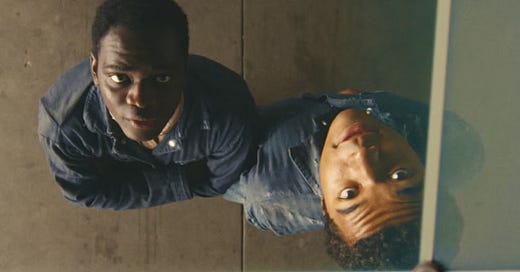Last week, I almost cried because Godard is dead, which has been true for over two years now. I was just, like, packing to go away for Christmas when it hit me once again that Godard is dead. I got a little bit misty.
Putting aside the fact that this is just generally abnormal, I was like, why am I still so sad about this? He had a long, incredible life; he kept making movies until the end. But when he was alive, that fact alone meant something for The Film Community. He was the fearless leader and patron saint. The future of cinema always felt bright because Godard was still pushing the cinema forward. It’s like a movement lost its leader. Who will keep the cinema alive?
Very quickly, like 15 names came up—there are plenty of filmmakers carrying the mantle of cinema in a post-Godard world: Hou, Hong, Tsai, Apichatpong, Coppola, Denis, Scorsese, are all still alive, most still working to push the medium forward. Everything’s fine lol.
Which is all to say, I think RaMell Ross, the director of the best film of the year Nickel Boys, is in those same ranks: a filmmaker with a style so uniquely personal as to create wholly new paths for cinema’s future.
In interviews, I frequently hear great writer-directors say that when they are writing, they are just writing, they don’t think about direction: that’s not something I’ve ever related to. I’m a visual person, and even more so, an aural person, so for me, the writing process is entirely just trying to find words (often, with great strain) to explain what I see and hear in my head, and how to shape that into a narrative. The images come first.
I’ve said before that there are directors who think “how do I bring this script to life” and there are directors who think “what are the images that tell this story,” the former being bound to the written word, and the latter not. Don’t get me wrong, some of the greatest films of all time have come out of a script-based thought process, but it is ultimately one notch inferior. I don’t know that RaMell Ross is in the latter group, but I have a suspicion1—the form drives every choice.
The formal strategies of Nickel Boys are astounding: I don’t want to give away the way its structure develops but the core strategy is the one they have used in the marketing: the camera is the POV of the protagonist, Elwood Curtis. The film’s first act teaches us how to watch the film, allowing us to immerse ourselves in what’s important to Elwood, solely by seeing what he sees.
The film is a symphony of human and natural detail, the one thing we remember about any emotional moment in our lives—the way someone’s hand looks, a billy club poking into a stomach, the light through a glass—accumulating bit by bit over 140 minutes to a climax that literally left me breathless. By keeping the audience’s POV as limited as the titular Nickel Boys’, not just narratively but visually, continually coming in on plot and emotional beats when they’re already practically done, casually existing on the edges of and beyond the frame, Ross forces us to fill in the blanks, as we would have to do in our own lives.
That rigorous commitment to a singular subjective experience, not of Elwood’s, but of the audience’s—of the film itself—forces us to remember that behind any one person’s eyes there’s an entire universe of experience and emotion, and that we are all ultimately having the same fundamental experience of life on earth.
This film exists as if it were a living, breathing person with a soul, such that the very idea of The Close-Up becomes something else, because the separation between the audience and the film has been completely collapsed, so that you are both seeing and seen, at the same time. I just think it’s a spectacular achievement.
And here, my top 25 films of 2024:
Nickel Boys
The Beasst
Do Not Expect Too Much from the End of the World
The Substance
Megalopolis
Queer
The Room Next Door
Stress Positions
Anora
Pictures of Ghosts
Last Summer
Juror #2
Challengers
The Feeling That the Time for Doing Something Has Passed
Dune: Part Two
Trap
The People’s Joker
Red Rooms
I Saw the TV Glow
Hit Man
Hundreds of Beavers
Hard Truths
La Chimera
Furiosa
Here
I plan to do some fixation-based interview listening soon




where do you generally land on Eastwood (or even "late Eastwood") as a filmmaker?
A fellow Megalopolis lover I see.